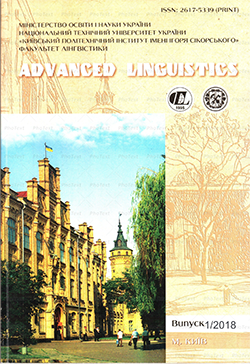COUNTRY-SPECIFIC CONTEXT WHILE TEACHING GRAMMAR
DOI:
https://doi.org/10.20535/2617-5339.2018.1.148816Ключові слова:
country study, grammar, grammar teaching, educational games, motivationАнотація
Presented article contains empirical considerations about effective teaching of grammar. Impulses, suggested in the publication, are designed to help teachers diverse and optimize the learning of grammatical material by thematic country-specific content. Authors point the difficulties that students face while the acquirement of grammatical material and those closely connected with motivation. One of the solutions of the presented problem is the usage of didactic games on the grammar lesson and the orientation on their country-specific thematic content. Authors suggest scripts of certain didactic games due to which not only the grammatical material is learnt but certain country-specific topics are presented as well. This attempt of unconventional combination of two integral components of the foreign language lesson is able not only to provide it with the integrated nature but makes it diversified and, moreover, interesting for the learners, what, in its turn, provides the efficiency of the educational process and acquiring of the material.
Посилання
Funk, H. et al. (2014). Aufgaben, Übungen, Interaktion [Tasks, exercises, interaction]. Deutsch lehren lernen, 4, 180. Munich, Germany: Klett-Langenscheidt.
Conesa, F. (2014). Grammatikvermittlung im DaF-Unterricht [Grammar mediation in GFL lessons]. Goethe-Institut. Available at http://pceik.pl/wp-content/uploads/2016/01/ Skript_Grammatik_MultisSulejowek.pdf.
Ende, K., Grotjahn, R., Kleppin, K., & Mohr I. (2013). Curriculare Vorgaben und Unterrichtsplanung [Curricular requirements and lesson planning]. Deutsch lehren lernen, 6, 152. Berlin, Munich, Germany, Vienna, Austria, Zürich, Switzerland, Warsaw, Poland: Langenscheidt.
Fornoff, R. (2013). Lexical country studies. Didaktik und Methodik im Bereich Deutsch als Fremdsprache. Zeitschrift für Interkulturellen Fremdsprachenunterricht, 18(2), 88–99.
Mátyás, E. (2009). Sprachlernspiele im DaF-Unterricht. Einblick in die Spielpraxis des finnischen und ungarischen Deutsch-als-Fremdsprache-Unterrichts in der gymnasialen Oberstufe sowie in die subjektiven Theorien der Lehrenden über den Einsatz von Sprachlehrspielen [Language learning games in GFL lessons. Insight into the game practice of Finnish and Hungarian GFL lesson in the upper secondary school as well as in the subjective theories of teachers on the use of language learning games]. Jyväskylä: University of Jyväskylä. Available at https://jyx.jyu.fi/dspace/bitstream/handle/123456789/21307/9789513936358.pdf.
Schart, M., & Legutke, M. (2013). Lehrkompetenz und Unterrichtsgestaltung [Teaching Proficiency and Lesson Design]. Deutsch Lehren Lernen, 1, 199. Berlin, Munich, Germany, Vienna, Austria, Zürich, Switzerland, Warsaw, Poland: Langenscheidt.
Ballweg, S. et al. (2013). Wie lernt man die Sprache Deutsch [How to learn the German language]. Deutsch lehren lernen, 2, 198. Munich, Germany: Klett-Langenscheidt.
Номер
Розділ
Ліцензія
Наше видання використовує положення про авторські права CREATIVE COMMONS для журналів відкритого доступу.
Автори, які публікуються у цьому журналі, погоджуються з наступними умовами:
1. Автори залишають за собою право на авторство своєї роботи та передають журналу право першої публікації цієї роботи на умовах ліцензії Creative Commons Attribution License, котра дозволяє іншим особам вільно розповсюджувати опубліковану роботу з обов'язковим посиланням на авторів оригінальної роботи та першу публікацію роботи у цьому журналі.
2. Автори мають право укладати самостійні додаткові угоди щодо неексклюзивного розповсюдження роботи у тому вигляді, в якому вона була опублікована цим журналом (наприклад, розміщувати роботу в електронному сховищі установи або публікувати у складі монографії), за умови збереження посилання на першу публікацію роботи у цьому журналі.

